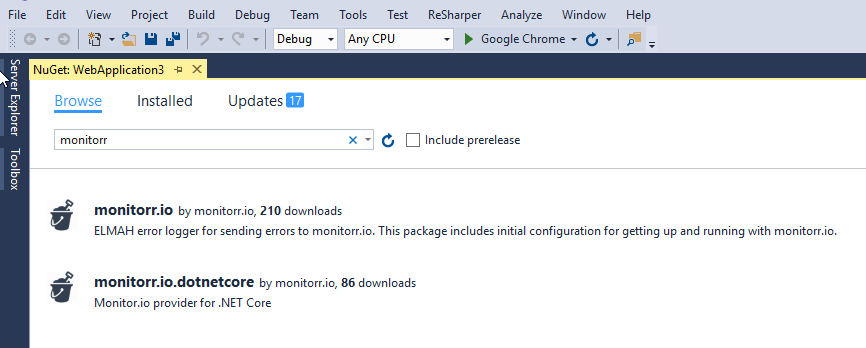.NET Core Quick Start¶
Installation¶
.NET Core package for monitorr.io is available on NuGet https://www.nuget.org/packages?q=Monitorr .
To install Monitorr into your .NET Core application, type the following command into the Package Manager Console window:
PM> Install-Package monitorr.io.dotnetcore
Using NuGet Package Manager¶
Right-click on your project in Visual Studio and choose the
Manage NuGet Packagesmenu item. Search forMonitorrand install the chosen package:
Configuration¶
After installing the package, configure the monitorr.io logger in Startup.cs or anywhere else where the application is being initialized.
public async void Configure(IApplicationBuilder app, IHostingEnvironment env, ILoggerFactory loggerFactory, DatabaseInitializer initializer)
{
loggerFactory.AddConsole(Configuration.GetSection("Logging"));
loggerFactory.AddDebug();
var logPath = Path.Combine(env.WebRootPath, "Logs/app-log-{Date}.txt");
loggerFactory.AddFile(logPath);
app.UseMonitorr(new Guid("d46d3856-4f88-4ebc-804d-8e592a9dad55"));
app.UseCors("CorsPolicy");
app.UseIdentity();
ConfigureAuth(app);
app.UseMvc(routes => { routes.MapRoute(name: "default", template: "{controller=Home}/{action=Index}/{id?}"); });
await initializer.SeedAsync();
}
Manual Logging¶
To manually log errors to monitorr.io use the Monitorr() extension and pass the LogId created at Monitorr Admin as well as the current HTTP context.
public IActionResult GenerateException()
{
try
{
var i = 0;
var result = 12 / i;
}
catch (Exception e)
{
e.Monitor(new Guid("d46d3856-4f88-4ebc-804d-8e592a9dad55"), HttpContext);
}
return Ok();
}
A dictionary of string key value pairs can be passed to the Monitor() extension to add any additional custom messages for more granular logging.
public IActionResult GenerateException()
{
try
{
var i = 0;
var result = 12 / i;
}
catch (Exception e)
{
var data = new Dictionary<string, string>
{
{ "Type", "custom logged error"},
{ "Message", "My custom message"}
};
e.Monitor(new Guid("d46d3856-4f88-4ebc-804d-8e592a9dad55"), HttpContext, data);
}
return Ok();
}